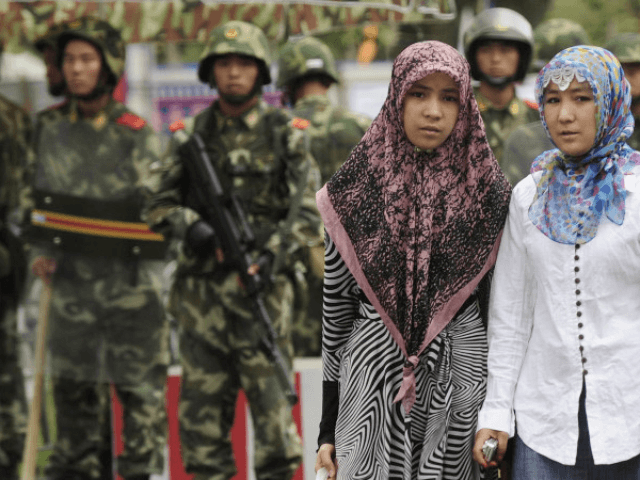A report published by Human Rights Watch (HRW) on Wednesday provided astounding details of the mass surveillance system China has imposed on Uighur Muslims, turning the cities of Xinjiang province into virtual prisons for those Uighurs not already incarcerated in re-education camps.
As HRW pointed out, many of these surveillance techniques are flagrantly illegal under Chinese law.
HRW wrote its report after gaining possession of a smartphone app used by Chinese law enforcement officials in Xinjiang province. Investigators worked backward from the app to determine what sort of information the Integrated Joint Operations Platform (IJOP) in China is collecting about residents of the province.
HRW billed the result as “an unprecedented window into how mass surveillance actually works in Xinjiang” and a chilling look at the future of mass surveillance across all of mainland China, since Xinjiang is a test bed for surveillance technology the Chinese Communist Party plans to roll out nationwide.
“Many – perhaps all – of the mass surveillance practices described in this report appear to be contrary to Chinese law,” HRW noted. “They violate the internationally guaranteed rights to privacy, to be presumed innocent until proven guilty, and to freedom of association and movement. Their impact on other rights, such as freedom of expression and religion, is profound.”
This is an important point because the Chinese government constantly postures as a great defender of the rule of law.
Western officials currently evaluating China’s promises that Chinese intelligence operations will never subvert its tech companies should contemplate its willingness to discard its own laws in the pursuit of totalitarian control at length. Along those lines, HRW held Chinese companies responsible for helping to create the Xinjiang surveillance network instead of respecting international human rights laws.
What HRW discovered is that China’s IJOP system is collecting an incredible amount of detailed personal information about Xinjiang residents and flagging them as “suspicious” for engaging in perfectly legal private behavior, such as “not socializing with neighbors” and making donations to local mosques. There have been numerous reports of Chinese officials asking citizens a huge number of bizarre and intrusive questions based on prompts from the smartphone app.
The system also flags people for more intensive surveillance based on the behavior of family members. If one member of a family obtains a new telephone number, all of his relatives are marked for closer observation. Many of these “suspicious” behaviors have absolutely no relationship to crime or terrorism, the ostensible reasons for China’s intensive surveillance of the Uighurs.
“The system is tracking the movement of people by monitoring the ‘trajectory’ and location data of their phones, ID cards, and vehicles; it is also monitoring the use of electricity and gas stations of everybody in the region,” HRW reported.
The IJOP automatically restricts the movements of Uighurs in a series of measures that resemble an even harsher version of China’s “social credit” system, which often tells surprised Chinese citizens the government has banned them from aircraft or trains because the central computers have decided they are troublemakers or deadbeats.
HRW saw parallels to the cruder, harsher controls of the Mao era, when Chinese communism began developing its mania for controlling where citizens live and restricting their movements. The IJOP gives China a way to “reimpose a Mao-era degree of control, but in a graded manner that also meets the economy’s demands for largely free movement of labor.”
The Chinese system is an outrage against international human rights standards because, among other deficiencies, it does not ask civilians for their consent when gathering personal information, it makes no allowance for the presumption of innocence, and it denies targeted citizens any access to legal counsel, the report argues.
HRW found the truth of Xinjiang province to be a grim mockery of claims by Chinese officials that they are using high technology to target “terrorists” with “precision.”
The report concluded with a call for tough international sanctions against China until it agrees to destroy the IJOP system, including U.S. sanctions under the Global Magnitsky Act. HRW warned that China is not only taking its surveillance state nightmare nationwide, but looking to export it to other countries as it angles for a commanding market share in facial recognition, biometrics, and other monitoring technologies.

COMMENTS
Please let us know if you're having issues with commenting.